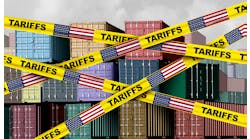There's more than one way to catch a quality carrier. For 30 years VHI Transport (Chester, Va., www.vhitransport.com) has been a certified transportation broker serving shipper's needs by reaching out to get capacity. Formerly known as Vfirginia Hiway, company leaders changed the name because potential customers thought the broker only served Virginia.
VHI's director of operations, Connie Alexander, says that as shipper needs have changed, the company has expanded. "We've added a lot of divisions, including air expedited, flatbed, container intermodal, tanker, refrigerated, dedicated and what we call spot division, which is the brokerage side itself."
VHI matches loads to carriers that call in, beginning at 7:00 am, and those that are called in the day before. It also uses several posting services to help with locating trucks. One of them is Getloaded.com.
"As soon as we add the load into our computer system, it spiders out to Getloaded.com and we get assistance from them," Alexander says. "We also get postings from trucking companies and drivers and drivers at truck stops. They are all watching load-matching boards. So we could get a call from a truck stop, a driver or a dispatcher who is monitoring our board, or the dot coms themselves."
For its part, Getloaded.com handles 140,000 loads each day. More than 23,000 trucking companies are registered with the Internet load board, representing over 500,000 trucks. VHI does all of the qualification of trucking companies and shippers itself. The company uses Getloaded.com to check carrier insurance or safety ratings. One of the shipping strategies that VHI is stressing right now is getting shippers to make dedicated freight commitments.
"We've just come out of a very slow fourth quarter, as slow as it's been in the last ten years. It just rolled right over into the first quarter of this year," Alexander explains. "We have great capacity right now, just about for any move in any division. But the third and fourth quarters have always had tighter capacity. That's where relationships come in. We decided to open the dedicated division because of that. We want to get commitments from our shippers as well as our carriers. So when it comes time for crunch time, we won't miss a beat this year."
Best known for its CzarLite Base Rate for shipper, carrier and third-party agreements based on "intelligent and fair" pricing, SMC3 (Peachtree City, Ga., www.smc3.com) also offers a collaborative, web-based less than truckload (LTL) bid service called Bid$ense. Moving step-by-step through the Bid$ense process, a shipper creates a request-forproposal (RFP) that contains all necessary data for getting needed pricing and service from a carrier.
"By guiding you through the qualities you need to consider in a carrier, you can be sure you haven't missed any key inputs to your decision-making process," explains SMC3's literature. The RFP is then distributed to carriers on behalf of the shipper or its logistics service provider. Carriers can accept or decline the RFP. Each carrier receives the same RFP and replies are uniform from all who choose to respond. CzarLite is integrated into Bid$ense, so common rating is shared by all sides.
For expedited shipments, InterChez Logistics Systems, Inc. (Stow, Ohio, www.interchez.com) has added premium freight optimization (PFO) to its menu of logistics services. Mark Chesnes, company president and CEO, explains, "Our system automatically sends bid requests to hundreds of expedited shipment providers. Within 20 minutes our PFO system analyzes bids received, picks the best service and the least cost solution depending on client parameters, and then places the shipment."
Chesnes claims nothing is growing globally faster than logistics. To help the global trade community, InterChez offers translation services in 150 languages for rendering documents or globalizing a website. If a client needs interpretation services, InterChez can pull in live interpreters—who reside in the country of origin for the language—into a conversation to clarify logistics issues for all participants.
"We recently had someone on the phone speaking Mandarin Chinese," recalls Chesnes, "someone speaking English and someone speaking Spanish. A shipment was coming from China, going through Spain on its way to the United States. We provided the necessary interpretation for the shipper to get the cargo imported and delivered."


